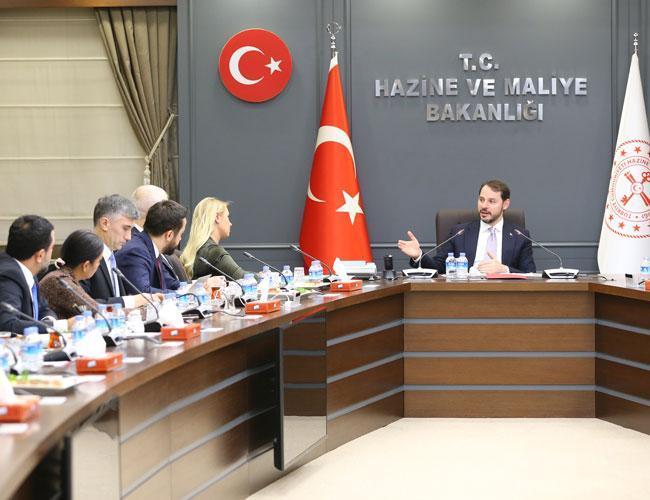
Turkish Treasury and Finance Minister Berat Albayrak has joined other senior government officials in denying speculations that Turkey is seeking support from the International Monetary Fund (IMF), stressing that the fundamentals of the Turkish economy are strong.
“Back in August-September, when the economy encountered volatility, we did not need it [IMF support]. From the economic point of view, it is out of question. Today, it is clear that Turkey does not need the IMF,” he told a group of journalists in the capital Ankara on Feb. 6.
At the meeting Albayrak addressed a number of issues, including growth, the fight against inflation, food prices and the possible transfer of the main opposition Republican People’s Party’s (CHP) share in the country’s largest private lender İşbank to the Treasury. His overall tone was rather optimistic, confident that the government will meet all targets set for 2019.
“2019 will be an interesting year. The recovery has been stronger than we had initially anticipated. We do not see serious risks to growth. Thus, the 2.3 percent GDP growth target we envisaged in the new economic program will be met. The economy will perform much better after the elections. We want an employment-oriented export-based growth. Tourism and export are the two main pillars supporting growth,” Albayrak said, referring to the upcoming March 31 local elections.
He noted that the U.S Federal Reserve’s latest decision — to pause rate hikes — is an opportunity for Turkey.
“Turkey captures a small share in global liquidity. Recently its share even became smaller. Given the attractive valuations of Turkish assets, FED’s decision creates opportunities,” he said.
Analysists had feared that if the FED continued to lift the rates that could trigger an exodus of capital from emerging markets. Now, most analysts think that emerging economies, including Turkey, may enjoy capital inflows.
On a related note, Albayrak noted that foreign direct investment (FDI) inflows into Turkey gained pace in the final quarter of 2018.
“In terms of FDI inflows, 2019 will be a good year,” he said, but did not give any figure.
Fight against inflation
As part of the efforts to fight against inflation, the government will take some concrete steps next week to curb the excessive increases in food prices.
“I agree with calling it ‘food terror.’ It is not surprising that those who support terror groups targeting lives target people’s livelihood. I requested an inquiry into the food speculation to identify those responsible,” Albayrak said.
According to the minister, there will be some important developments regarding vegetable prices next week.
Municipalities will start to provide affordable products. This will be a comprehensive, integrated approach covering every step along the chain from farm lands to consumers. We will also unveil a package next week aimed at transforming, encouraging new investments in greenhouse cultivation. As the public sector, we will devise a strategic investment plan for greenhouse cultivation. We will create a strong ecosystem and will take those steps fast,” Albayrak said.
As far as the debates centering around the transfer of the CHP’s shares in İşbank to the Treasury, Albayrak commented that there are political and technical aspects to it.
“Parliament will take some steps [regarding the share transfer]. If those measures are taken, a much stronger institution will emerge. It is already a successful bank, but such a change will have positive impact on its balance sheet. This will also boost confidence and have a favorable effect on the market.”
Noting that interest rates on loans have declined some 10 points over the past three years, the minister said the decline will gain momentum in line with the overall rebalancing in the economy.
Albayrak, however, stressed that despite the decline in interest rates the loan volume is not growing.
“We are keeping a close eye on credit development. We expect some normalcy starting from March,” he said, calling on banks to extend loans.
The minister also said that he did not have any expectations from the Central Bank in terms of interest rate decisions.
“I do not want the Central Bank to do this or that. Everybody should do their jobs. We will manage the monetary policies well. The Central Bank will make its decision based on data at hand,” he said, stressing that the bank is independent.
The minister also told journalists that the early retirement is not on the government’s agenda and Ankara is working on a comprehensive tax reform.